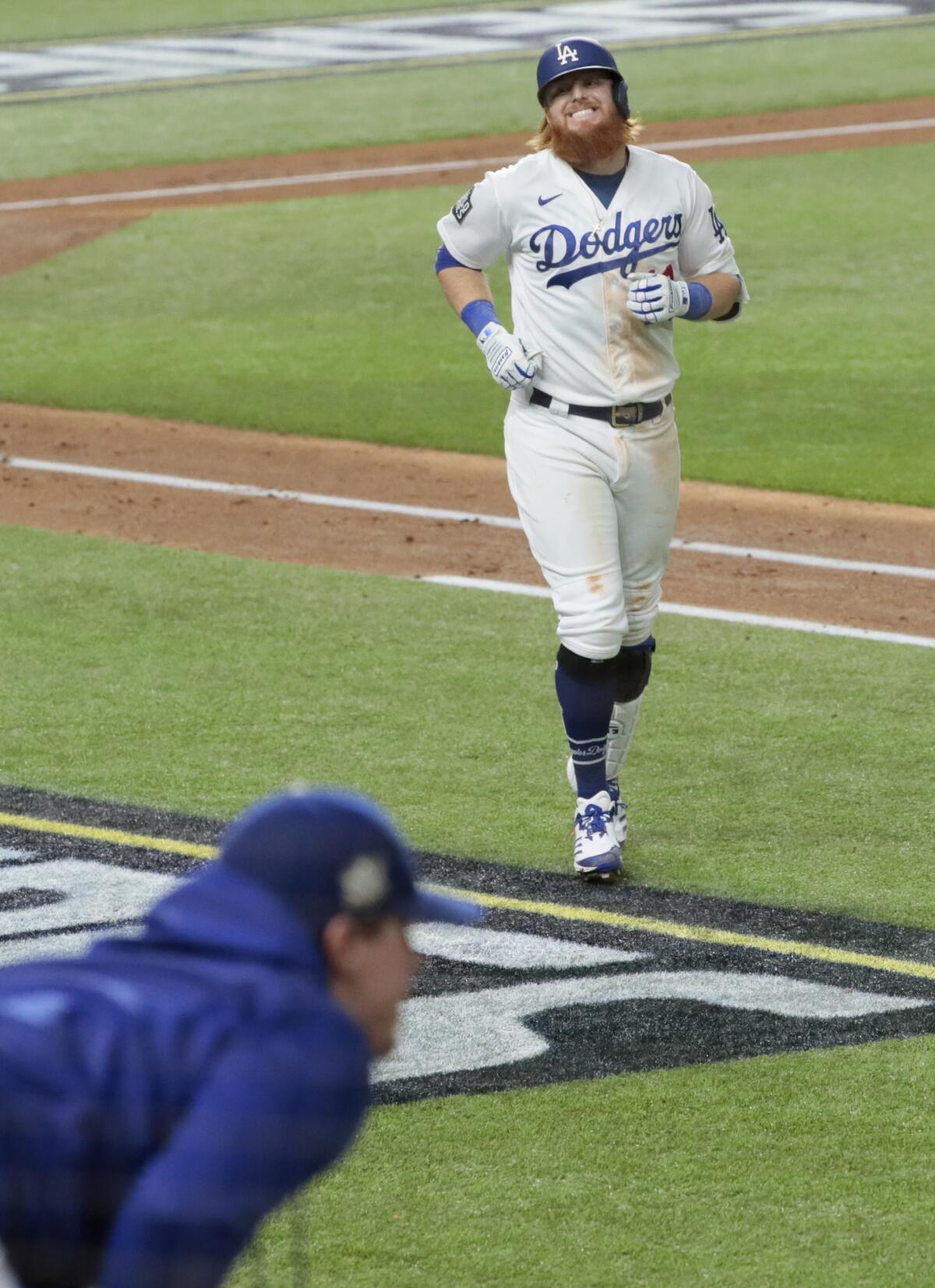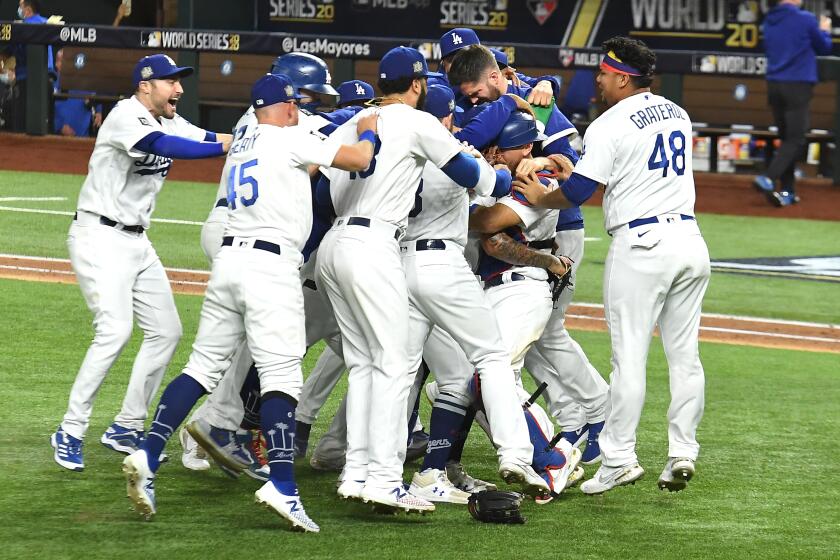Justin Turner’s quiet leadership shines during the strangest of championship seasons

- Share via
We were just two weeks into the new year when 2020 struck. In a nine-page report, Commissioner Rob Manfred detailed exactly how the Houston Astros had cheated in the 2017 season “and throughout the postseason.” Those four words unleashed a tidal wave of civic anguish.
The Astros had won the 2017 World Series, in Game 7, at Dodger Stadium. That was as close as the Dodgers had gotten to a championship in the 32 years A.G. (After Gibson). For the Astros, there would be hell to pay.
“They cheated. They got away with it,” Dodgers infielder Kiké Hernandez said at the team’s fan festival two weeks later. “They got a ring out of it.”
The Astros were roasted on the marquee of a movie theater. Thousands of Dodgers fans organized a trip to Anaheim, for the sole purpose of jeering the Astros. The Los Angeles City Council approved a resolution demanding Manfred strip the Astros of the 2017 title and award it to the Dodgers.
That City Hall sentiment was boosterish and farcical. Third baseman Justin Turner stepped up and said so.
The Dodgers defeated the Tampa Bay Rays 3-1 in Game 6 of the World Series to win their first championship since 1988.
“We don’t want a fake banner hanging in our stadium,” Turner said. “We didn’t earn that.”
Turner led the Dodgers on their quest for a real banner. Mission accomplished.
The championship caps what arguably is the greatest era in Dodgers history, with eight straight division titles to flank that trophy.
The Brooklyn Dodgers played in the World Series six times within 10 years, with a lineup studded with Hall of Famers Roy Campanella, Jackie Robinson, Pee Wee Reese and Duke Snider.
The bottom line in that era was the same as the bottom line in this era: one championship. But, in the Brooklyn era, the postseason was the World Series: the best team in the National League against the best team in the American League. There were no divisions, no wild cards, no playoff rounds. This year’s Dodgers survived four playoff rounds.
Clayton Kershaw might well be the lone Hall of Famer from this era. But it was Turner, not Kershaw, whom catcher Austin Barnes called “the heart and soul of this team.”
It was Turner who had the strength to shrug off the Dodgers’ winter pursuit of Anthony Rendon, who would have replaced him at third base.
It was Turner who had the power to emerge as the Dodgers’ all-time leader in postseason home runs. It was Turner who had the instincts to launch himself into midair, apply a tag and then catch another runner on the bases to complete a critical double play in Game 7 of the NL Championship Series.
And it was Turner who had the accountability to start a chain of text messages among players after Game 4 of the NLCS. The Dodgers might be facing three consecutive elimination games, but he reminded them they had the opportunity to do something special.
They did, after seven straight choruses of a sad October song.
In a nonpandemic year, reporters would enter the clubhouse and capture the atmosphere in a room of players whose season has come to a sudden halt, short of the collective goal.
Boxes would be packed. Handshakes and hugs would be exchanged. Some players would linger amid the melancholy. Kenley Jansen would pledge that a championship was coming soon. And, in his corner of the clubhouse, Turner would take a few questions.
He would talk about the game, and the season, but woe to the reporter who asked him to be anything but supportive of a teammate or his manager, or to field a lighthearted question in that moment.
“Once I got here,” Mookie Betts said the other day, “I got to see the kind of person he is, the leader he is. He loves to have fun, but he’s also that person that you can always go talk to about something in the game that you may not understand. He’s been around for a long time, so he’s been through a lot.
“It’s great to have someone like that in the clubhouse, a leader like that in the clubhouse.”
Turner was genuinely pained each October. He was a conscience of the team, in the clubhouse and in the community. When coronavirus outbreaks threatened the viability of the season, Turner rallied his teammates to agree that the Dodgers would go above and beyond the league’s health and safety protocols.
Turner loved to share the story of how he watched the Kirk Gibson home run in his grandmother’s home, just shy of his fourth birthday. When the Dodgers would introduce a military veteran to the crowd at Dodger Stadium, Turner was the one player who always would go out of his way to shake that veteran’s hand, even during a game in which he was playing.
He has come a long way with his hometown team. In 2014, he made the team as a nonroster invitee to spring training, and he spent the first month of the season backing up Dee Gordon at second base and Hanley Ramirez at shortstop.
Three years later, he was an All-Star, and the Dodgers were in the World Series. The clubhouse slowly was remade in his image, with players receptive to new ideas and committed to low-key substance over flashy style.
The Dodgers’ management does not traffic much in sentiment, so the fact that Turner has blossomed into an All-Star third baseman and fan favorite might not matter as much as the fact that his contract has expired, and he turns 36 next month.
His statistics still are good. The free-agent market will not be, with industry revenues depressed by the pandemic. For Turner and the Dodgers, there ought to be a road to return.
It would be unfortunate if Turner had played his final game for the Dodgers in a ballpark more than a thousand miles from Dodger Stadium. Of all the ballparks, in all the states, in all the world, this one was in Texas.
Ah, Texas, home to baseball’s pariah. There will be no asterisk attached to the Dodgers’ trophy. Winning well is the best revenge.
More to Read
Are you a true-blue fan?
Get our Dodgers Dugout newsletter for insights, news and much more.
You may occasionally receive promotional content from the Los Angeles Times.








